Menu
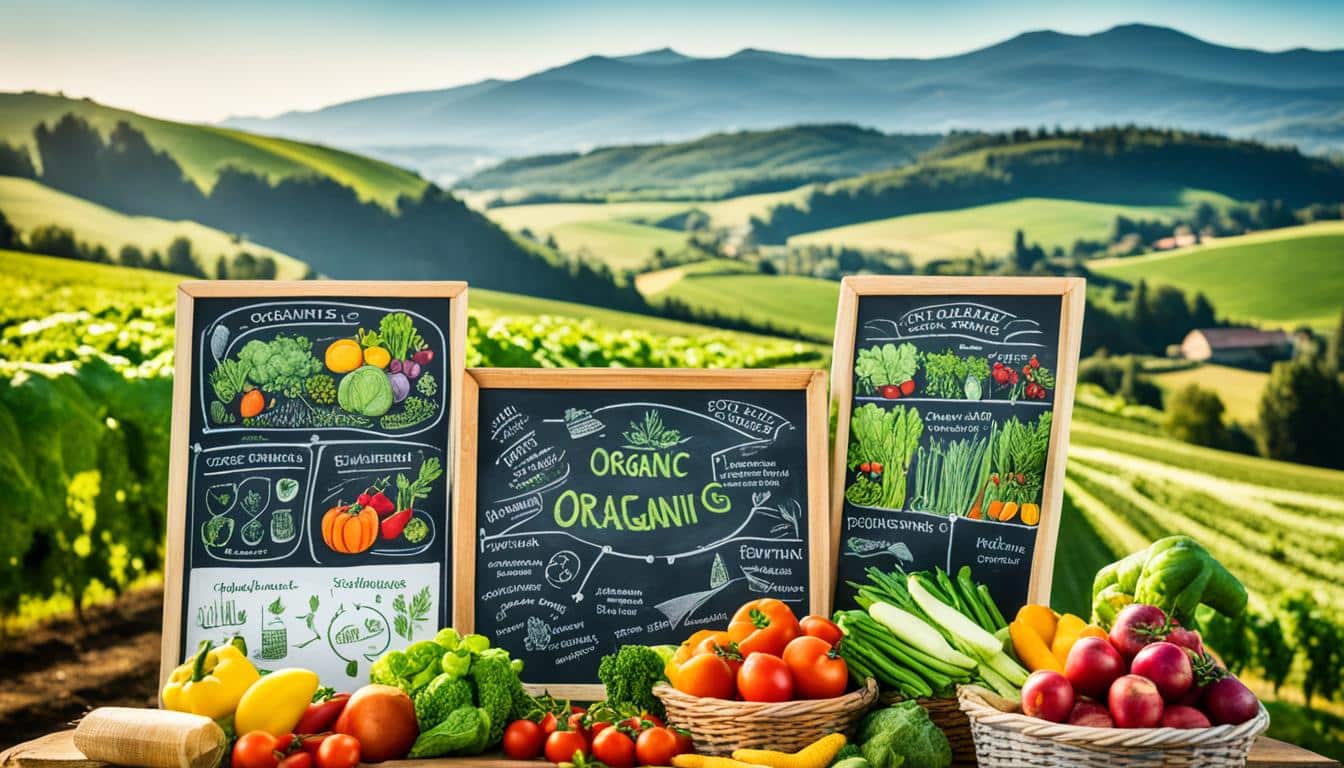
From 2011 to 2017, there was a nearly 75% increase in organic farms in the United States. This growth shows a rising interest in organic farming practices. But moving from traditional to organic farming is not simple. Thankfully, there is a lot of help available.
The Organic Farming Research Foundation (OFRF) has a special training programme. It is for new farmers and old ones moving to organic farming. While it’s aimed at those growing specific crops in California, its knowledge helps farmers across America. The programme offers lots of educational stuff like readings, videos, and pictures. It’s a joint project with the University of California and the California Polytechnic State University. This makes the training very strong in the area of sustainable agricultural practices.
There’s a growing interest in organic farming. With many educational resources available, it’s easier than ever to switch to sustainable agriculture.
Organic farming education is vital for those wanting to farm the right way in the USA. This new initiative offers a lot for new farmers. It’s not just for those in California but for anyone in the US keen on organic farming.
There are special organic cultivation seminars to teach the basics of organic farming. And the USDA makes getting certified affordable. This helps small-scale farmers, even with tough rules to follow.
This programme mixes things up with eco-friendly farming workshops and agroecology learning programs. They give a thorough insight into sustainable farming methods. You get to do things hands-on, like learning about healthy soil, planting cover crops, and controlling pests.
The USDA’s SARE programme has lots of useful stuff like books and videos for organic farmers. They also suggest checking out the eOrganic Community of Practice. There, you can find webinars and tips from experts on organic farming.
The USDA offers tools to help switch from traditional to organic farming. These tools include a planner, farm examples, and a course for an easy transition. They focus on the benefits of being sustainable for getting an organic certification.
“The organic farming education initiative changes the game for farmers wanting to use sustainable methods. With these resources, we aim to improve organic farming standards nationally.”
Overall, the programme brings together many educational resources. From online content to hands-on workshops, it’s all about creating a knowledgeable community of organic farmers in the US.
Exploring online resources for organic farming education reveals a wealth of information. These resources fit various learning styles, from courses to interactive platforms. They’re key for anyone wanting to boost their knowledge of organic farming.
The USDA’s National Organic Program provides an Organic Educational Toolkit. It has in-depth training and guides. For free content, the eXtension Campus offers the “Organic Seed Production” course. It teaches about seed production for different crops.
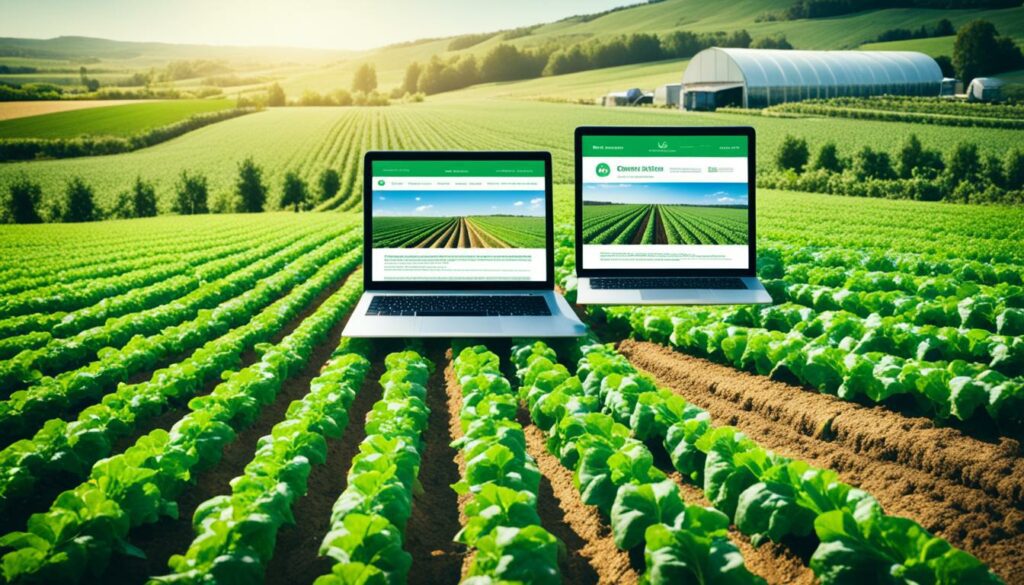
Webinars and videos are also important tools for learning organic farming online. The SAEA YouTube channel is a great resource, with lessons on agriculture. It covers topics like soil health, weed control, and water management, which are vital for farming.
eOrganic and the National Center for Appropriate Technology offer interactive learning. They make studying organic farming interesting and effective. The USDA’s Organic Agriculture Modules are also praised for their interactive content.
| Course Name | Enrollment Fee | Certified Crop Advisor (CCA) CEUs |
|---|---|---|
| Introduction to Organic Dairy Production | $150 | 15.0 |
| On the Ground: A Closer Look at Organic Dairy Pastures, Forages, and Soils | $75 | 15.0 |
| Organic Seed Production | Free | — |
Above, you see key online courses explained in a table. This makes it simpler for students to pick the right course. With these online resources, learning about organic farming is both easy and comprehensive.
On-farm organic training is key for those wanting real agriculture skills. Groups like the USDA help a lot. They make useful resources for beginners and pros. This ensures everyone learns lots and gets hands-on skills.
The USDA helps producers understand organic farming certification. They also help with things like soil health and managing pests. For new farmers, the USDA’s website has lots of tools to help them start.
Interning at a local farm teaches a lot. It includes looking after crops, animals, and the land. The USDA’s eOrganic helps with useful articles, webinars, and videos. This, along with groups like the National Center for Appropriate Technology, makes sure interns get a thorough education in organic farming.
Workshops are great for learning practically. The SARE program gives out books and guides. The National Agricultural Library helps a lot too, with an extensive collection aimed at organic farming enthusiasts.
The Rodale Institute’s RIFT school offers a unique 9-month course. Students get 22 months of support to begin organic farming. They also get help from experts and other program graduates.
In conclusion, on-farm organic training is vital for aspiring farmers. With practical skills and internship experience, they are well-prepared for farming. These opportunities are key for becoming skilled in sustainable agriculture.
Organic farming education is growing at universities and colleges. Places like Washington State University (WSU) are leaders in this. They offer full degree programmes and certificates in organic and sustainable agriculture.
In 2006, WSU started a major in Organic and Sustainable Agriculture. It’s a four-year course focused on teaching sustainable farming. At the Eggert Family Farm, which is now 30 acres, students learn hands-on skills.
This degree is part of the Crop & Soil Sciences Department. It teaches a wide range of topics such as organic animal care and pest control. With this degree, students can become farm managers, inspectors, or food developers. They can also choose to study more about soils and plants.
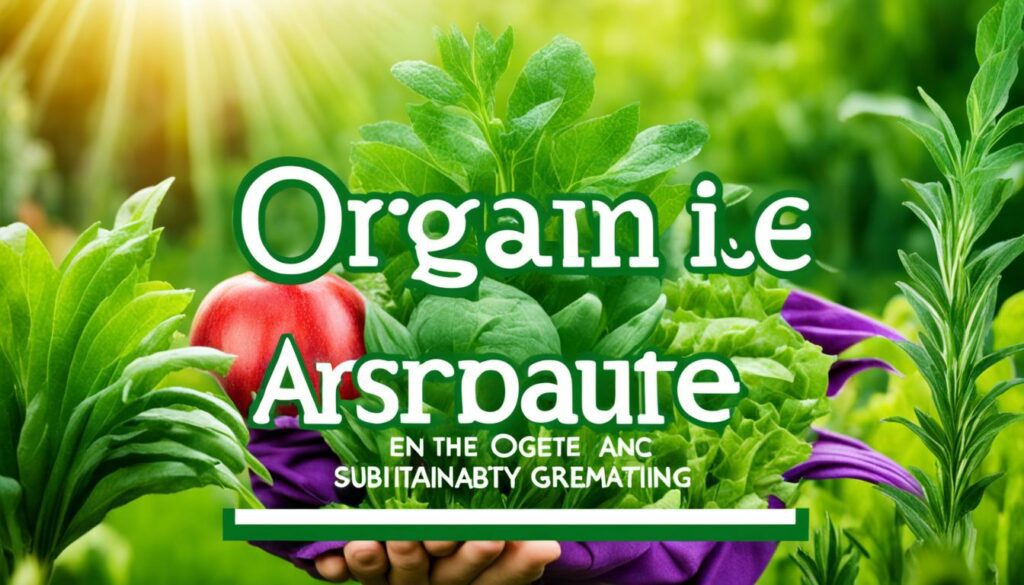
WSU also has an 18-credit Certificate in Organic Agriculture, which you can get online or on campus. The programme focuses on important topics like certifying farms as organic and managing pests in a natural way.
This certificate fits well with a student’s main courses. For it, you need to do well in certain classes and keep a good GPA. But you’ll learn a lot and be ready to work in the growing field of organic farming.
If you want to continue learning after the certificate, WSU has lots of support. There are clubs and organisations that help, like the Organic Ag Club and MANRRS. These groups prepare students for a successful career in organic farming.
Getting an organic certification can be tricky. The USDA’s National Organic Program (NOP) has many tools to help. If farmers learn and follow the rules, they can get certified.
To start, farmers must know what the USDA asks for. The National Organic Program Handbook has guides for different types of farming. It also has certification examples.
Certification costs can vary a lot. They might be from a few hundred to several thousand dollars. But, the USDA can pay back up to 75% of these costs for some farms.
For three years, the USDA helps farmers switch to organic methods. They provide money and advice through the Environmental Quality Incentives Program (EQIP). Here’s a quick look at what’s offered:
| Type of Assistance | Details |
|---|---|
| Technical Assistance | Guides and Consultation |
| Financial Aid | 75% Cost Reimbursement |
Keeping the organic certification requires following specific, ongoing practices. This includes not using prohibited substances. It also means keeping detailed records.
The USDA’s Natural Resources Conservation Service helps by looking at farm practices. They make sure things like pest control and soil health meet the standards.
There are lots of webinars and online resources for extra help. The NRCS has nearly 40 video lessons on things like soil health. The eOrganic Community and the National Center for Appropriate Technology also offer training.
In the United States, USDA organic resources and non-profit training are key for farmers. These resources help with the challenges farmers face, whether they are starting or already certified. They are made by the USDA working with non-profits.
The USDA’s Natural Resources Conservation Service has over 40 Conservation Webinars. These cover many organic on-farm conservation topics. The USDA National Agricultural Library also helps a lot, with a lot of info about organic farming. This includes a special collection of old USDA documents about organic farming, called “Organic Roots.”
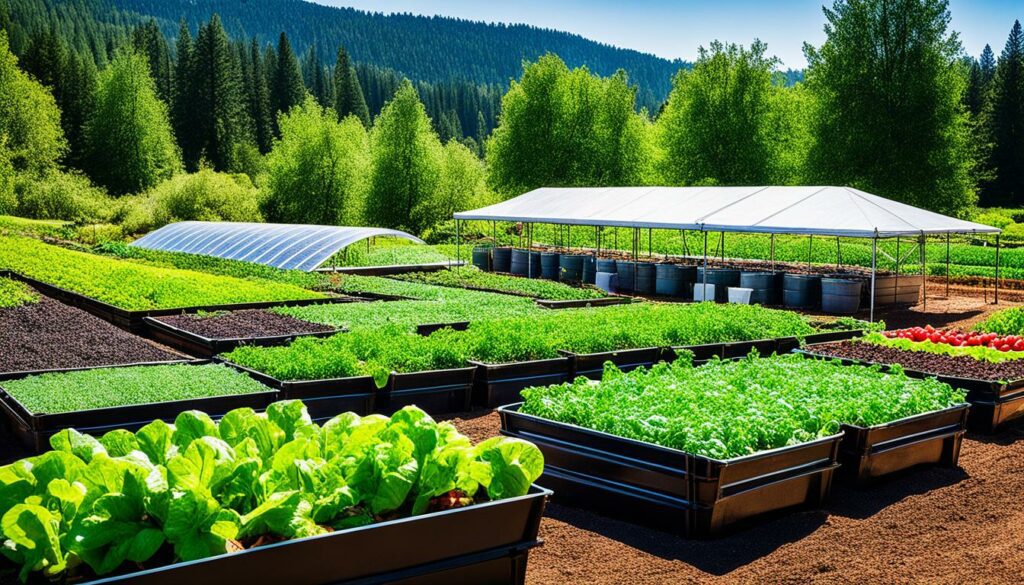
The National Center for Appropriate Technology (ATTRA), funded by the USDA, gives great organic farming, ranching, and food processing materials. These help people understand the principles of organic agriculture.
The SARE program is also important, supported by the USDA. It offers books, case studies, guides, and videos about organic production. The Rodale Institute, with USDA’s help, offers an Organic Transition Course. It’s for farmers moving from conventional to organic farming.
The USDA’s National Institute of Food and Agriculture supports tools like the “Organic Transition: A Business Planner for Farmers, Ranchers, and Food Entrepreneurs.” It helps those going organic plan effectively.
The Organic Integrity Learning Center, backed by the USDA, has over 30 courses on organic certification and inspection. Topics include Inspection Basics, Organic Fraud, Rules and Enforcement, and Nature Protection. Also, the National Organic Program provides online training to people in the organic industry. This includes certifiers, inspectors, and compliance specialists. They learn to keep organic certifications honest.
There are lots of courses available, covering important areas. These include certification rules, preventing fraud, farm practices, tracing animals, and monitoring rules. These training resources help people in the organic sector keep up to date with organic rules and practices. This ensures the growth and honesty of the organic market.
Permaculture looks at farming in a smart way that works with nature. You can start with simple courses about the basics. Or, you can go deep with advanced classes on permaculture design.
The basic phase teaches you all key permaculture design ideas. These courses show how ecological education fits farm systems. The Permaculture Life YouTube channel has over 100,000 followers, showing lots of people want to learn how to use permaculture.
The International Permaculture Festival brought together 32 speakers from across the globe. They talked about permaculture design and its wide-reaching appeal. This big interest highlights a strong desire for learning sustainable ways and fitting them to local needs.
People serious about learning deep ecological design love advanced permaculture classes. The Permaculture Education Institute has won awards for teaching excellence. They aim to give students the tools to use and teach advanced permaculture ideas effectively.
They also have lots of online courses to suit different learners. Their podcasts, masterclasses, and blog help educate millions worldwide yearly. Plus, their #freepermaculture program offers a year of weekly bite-sized lessons.
The Permaculture Education Institute is really making a difference globally. By joining their newsletter, you get a free webinar on teaching permaculture and making money. This is great for anyone interested in ecological design education.
For those looking to start learning permaculture or taking advanced courses, there are so many options. The aim is not just to grow personal know-how but to push for a more sustainable world together.
Regenerative agriculture classes are very popular. They are for farm experts, such as farmers and producers, and people who know about agriculture. The Centre for Regenerative Agriculture and Resilient Systems at Chico State is a key place. It offers detailed courses through Chico State Professional & Continuing Education for four to six weeks. This gives students valuable Continuing Education Units (CEUs), showing the course’s educational value.
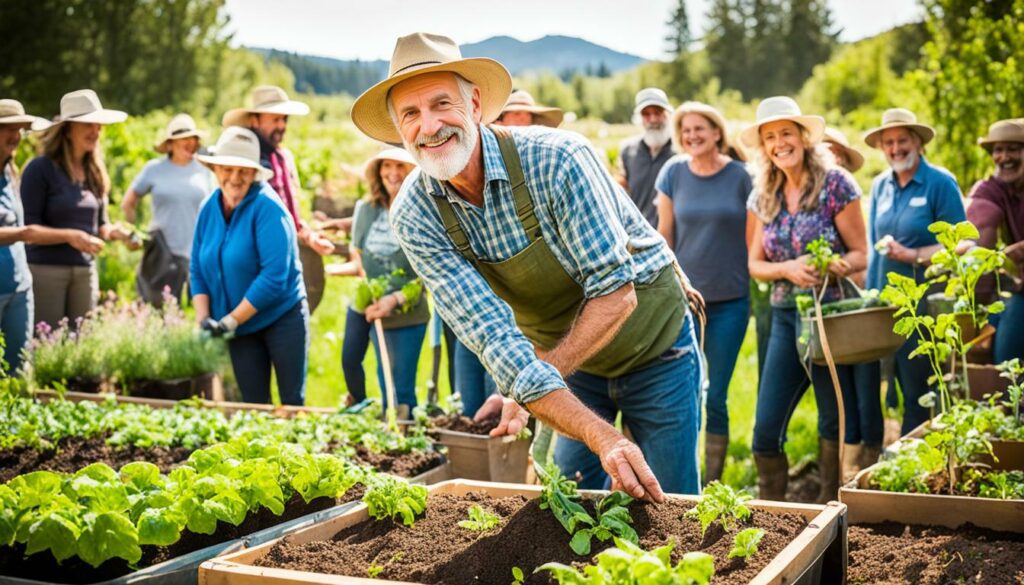
Classes on soil health are an important part of regenerative farming. Students learn about regenerative forestry and how to manage soil health. They also learn about whole farm planning. These lessons help them understand how to keep soil healthy.
Carbon farming is also key. This part focuses on ways to make soil better at storing carbon. Organisations like Understanding Ag and Regen Ag Academy teach these practices. They help in reducing the impacts of climate change by storing more carbon in the soil.
Using conservation tillage helps keep the soil productive without hurting it. It’s important for farmers wanting to farm sustainably. They get to practice these skills in workshops and field sessions. This teaches them the real use of these techniques.
The Regenerative Agriculture crash course happens in Murcia, Spain. It’s a quick, intensive five-day programme. It teaches new skills for improving landscapes and soils. The course has lectures, workshops, and hands-on field training led by experts. It’s open to all, making it an easy way for anyone interested in regenerative farming to start.
With support from companies like Walmart, PepsiCo, and ADM, regenerative farming is growing fast. People learn a lot and join a big change in farming that’s more sustainable. It’s a great step toward a future with eco-friendly farming methods.
Agroecology learning is vital for blending farming with protecting our environment. It focuses on how plants, animals, and people work together within their surroundings. This approach teaches both practical skills for the land and the science behind sustainable farming.
The National Organic Program (NOP) backs many training courses. These courses, like the ones at the Organic Integrity Learning Center, help spread the word on organic farming. They have over 30 classes on important topics like the rules of being organic and how to make sure farms follow these rules.
The Learning Center offers videos, detailed course info, and learning aids. It’s great for anyone wanting to learn about stopping fraud in organic farming or how to track where food comes from. To use the Learning Center, you just need to make an account. This helps you keep track of your courses and progress.
| Institutions | Courses Available | Degrees Offered |
|---|---|---|
| University of California, Davis | Bachelor of Science in Sustainable Agriculture and Food Systems | BSc |
| University of Florida | Bachelor of Science Minor in Organic and Sustainable Agriculture | BSc Minor |
| North Carolina State University | Bachelor of Science in Sustainable Agriculture | BSc |
| University of Massachusetts | Bachelor and Associate of Science in Sustainable Food and Farming | BSc, AS |
| California Polytechnic State University (Cal Poly) | University-wide Minor in Sustainable Agriculture | Minor |
| Warren Wilson College | Environmental Studies with a concentration in Sustainable Agriculture | BA, BSc, Minor |
| Prescott College | Master of Science in Sustainable Food Systems | MSc |
| Austin Community College | Sustainable Agriculture Entrepreneurship Certificate | Certificate |
| Cégep de Victoriaville | Diploma of College Studies in Organic Vegetable and Fruit Production | DCS |
Workshops on eco-friendly farming are a great help for farmers wanting to go green. They get to learn first-hand and get advice from experts. This helps them boost their skills and make their farms more sustainable.
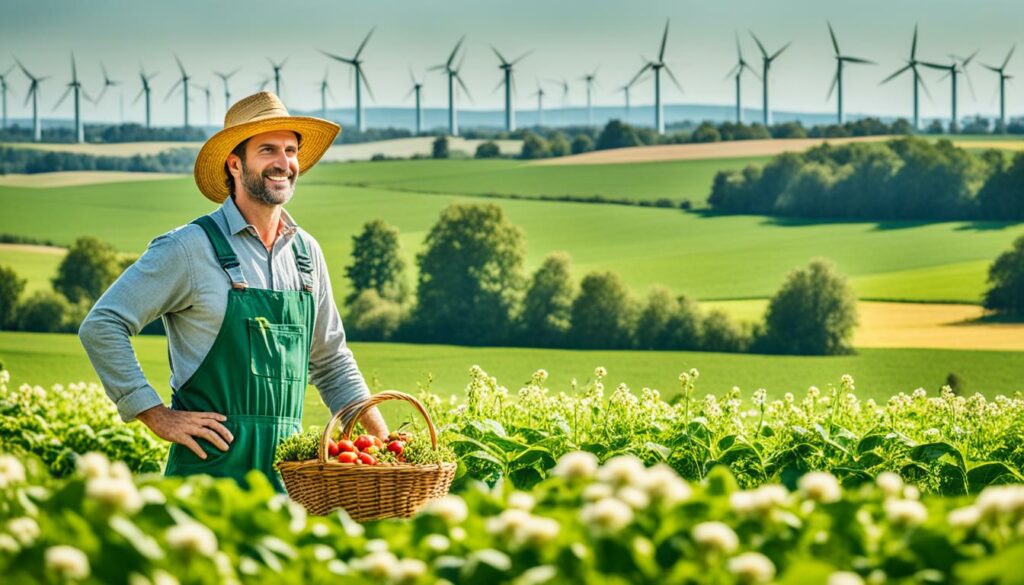
At these workshops, farmers learn how to choose and manage cover crops. Cover crops are great for the soil and they stop erosion. They find out about different cover crops and what each one does. Experts from the University of Kentucky show them how to pick the right cover crops for their farms.
Water use in farming is another key area of focus. It’s important to use water wisely to protect our environment. Workshops explore various ways to manage water, from smart irrigation to reusing water. The NRCS of Kentucky offers help through the EQIP. They fund and provide tech help for projects like stock water systems. These projects help farmers manage water better.
Farmers learn lots from these workshops. They learn practical skills for sustainable farming. And this is good for their farms and the planet.
In today’s world, being eco-friendly is key. Sustainable farming educational programmes are important. They teach farmers ways to be green and stay in profit.
The USDA helps farmers switch to organic. They make getting organic certification easier and cheaper. The National Organic Program gives farmers the tools they need.
The USDA also helps farmers go organic with its NRCS. They offer handbooks and online lessons. These teach farmers how to use sustainable farming in their work.
USDA’s website for new farmers gives them a start. It offers help and tools for people new to farming. This support is critical for those moving into organic farming.
The eOrganic group, backed by the USDA, has a lot of helpful stuff online. They have articles, webinars, and videos on farming. There’s information on dairy, fruits, and more. This is great for farmers looking for detailed organic farming tips.
The National Center for Appropriate Technology also lends a hand. They offer info and classes on organic farming. Plus, they have a phone line for any questions. They’re ready to help farmers at any level.
For over 30 years, the SARE program has led the way in green farming. They’ve put over $251 million into 6,300 projects. This money has funded new farming methods and helped farmers. The support includes things like better soil health, which makes farms stronger.
Look at how SARE has helped in different areas:
| Funding Area | Investment | Outcome |
|---|---|---|
| Conservation Tillage | $20.6 million | Improved soil health |
| Crop Rotation | $16.4 million | Increased yield resilience |
| Grazing Management | $41.4 million | Enhanced grazing systems |
| Soil Health Research | $31.9 million | Advances in agronomic practices |
These programmes are a big help for farmers. They teach about green farming and help growers succeed. Plus, they do a lot to protect our planet.
Getting involved with organic farming communities helps you learn and share with others. This is great whether you’re new or have lots of experience. You keep up with all the new things happening in organic farming and how to do it sustainably.
Joining organic farming online communities is easy online. You can find people who are interested in the same things you are. They talk about new farming methods and how to fix problems. Places like the eOrganic Community help a lot. They share articles and let you ask experts questions.
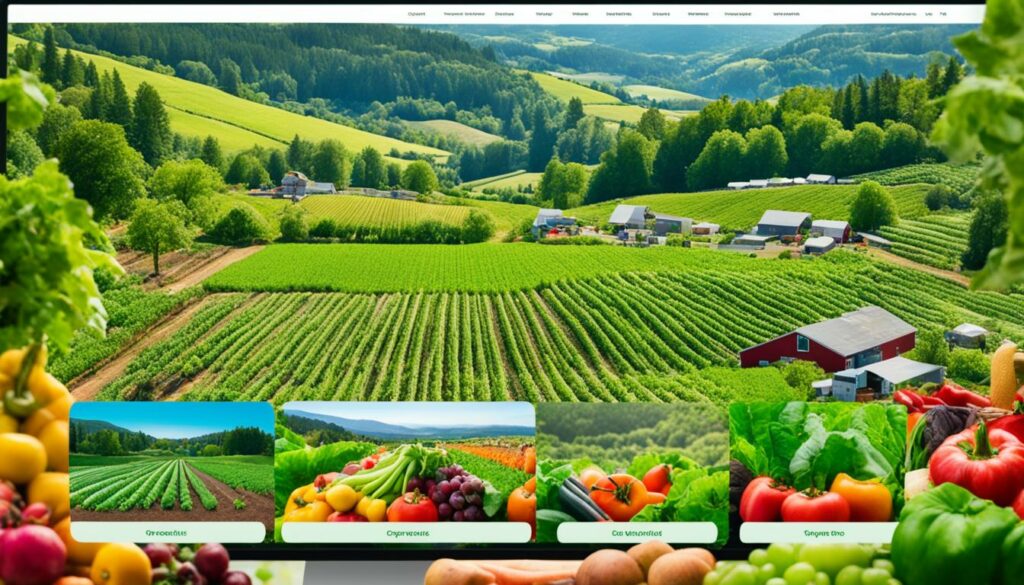
Getting in touch with local organic agriculture networks can give you the help you need. They organise training sessions and projects that bring farmers together. The National Center for Appropriate Technology also helps by giving out useful information and training.
Going to organic farming events can be really informative. You get to hear from experts and find out about new studies. Even the USDA’s workshops on soil health and water are helpful. And don’t forget about WWOOF. They offer ways for you to learn by working on farms around the world.
| Resource | Description |
|---|---|
| eOrganic Community of Practice | Research-based articles, webinars, videos, and expert advice. |
| WWOOF | Global network offering cultural and educational exchanges on organic farms. |
| National Center for Appropriate Technology | Training and publications on organic farming, including toll-free phone support. |
| USDA Natural Resources Conservation Service | Conservation webinars covering various on-farm conservation practices. |
Getting funding is key for those starting organic farming. Many organic farming grants and financial help are out there. These aim to grow the field and support those choosing eco-friendly ways.
The USDA leads, giving different forms of financial support for organic farmers. For instance, the Farm Loan Program has low-interest loans. These help farmers upgrade their work. Also, the Farm Storage Facility Loans offer cheap money. It helps build or improve places for keeping organic produce safe.
According to the National Young Farmers Coalition, the big issues for new farmers are getting land and money. The USDA FSA Down Payment Loan Program helps starting, minority, and women farmers buy their farm. The Noninsured Crop Disaster Assistance Program covers some farming disasters for new and low-money farmers. This keeps them safe from big losses due to weather or pests.
The Future Organic Farmer Grant Fund gives big money for agricultural education. It’s for students studying organic farming. Iroquois Valley Farms helps young farmers with long leases and mortgage help. This support helps them get off to a good start.
Crowdfunding is important too. Barnraiser and Kiva let farmers and food businesses ask many people for help. Kiva gives loans with no interest up to $10,000. This gives a big push without worrying about paying back a lot of interest.
There’s a special program at Stone Barns Center for those working with regenerative farming. It teaches about new ways of farming that are kind to the earth.
The table below summarises key funding and grant opportunities for organic farmers:
| Funding Source | Description | Type |
|---|---|---|
| USDA Farm Loan Program | Low-interest micro-loans and conservation loans | Loan |
| USDA Farm Storage Facility Loans | Low-interest financing for storage facilities | Loan |
| USDA FSA Down Payment Loan Program | Financial assistance for beginning, minority, and women farmers | Loan |
| Noninsured Crop Disaster Assistance Program | Free catastrophic coverage and discounted premiums | Coverage |
| Future Organic Farmer Grant Fund | Financial aid for organic agriculture students | Grant |
| Iroquois Valley Farms | Long-term leases and mortgage finance support | Lease/Finance |
| Kiva | 0% interest loans up to $10,000 | Loan |
| Barnraiser | Crowdfunding for sustainable farm and food businesses | Crowdfunding |
| Stone Barns Center | Entrepreneurship Intensive program | Training/Grant |
Exploring organic farming education has shown us its vast scope. This field needs support from many areas to thrive. We see a growing focus on training farmers in eco-friendly methods. This is crucial for their success in a world facing climate challenges.
Though organic sales are small now, they’re increasing fast. People are willing to pay more for these products. This demand is pushing more farmers towards organic methods. In turn, this benefits their farms and the environment. Organic farming also does well in areas with less water, offering a sustainable approach.
Support from governments, like through subsidies, is key for organic farmers. The U.S. EPA’s actions to protect bees show a wider environmental concern. The use of fewer chemicals in organic farming is better for health and the planet.
The future of teaching about organic farming will focus on more research and policies. Adaptability in different climates will also be a significant point. Promoting the use of organic fertilisers and sustainable methods is vital. This can keep a balance in nature and our economy.
Organic farming education means learning about farming that is kind to the earth. It includes teaching farmers how to grow crops and raise animals without hurting the environment. This type of education focuses on using natural methods to help the planet.
Yes. The Organic Farming Research Foundation gives free lessons for new and transitioning farmers. The lessons include interesting readings, helpful videos, and other visual aids. This self-paced programme is full of great resources.
There are many webinars that discuss important topics. These include managing weeds, taking care of the soil, and using water wisely. There are also special sessions on growing crops in an organic way.
There are several ways to get practical experience in organic farming. You can join on-farm training from the USDA or find local internships. Also, workshops offer direct experience in applying sustainable farming methods.
Yes, there are many courses in sustainable agriculture offered at educational institutions. These range from full degrees to shorter certification programmes. They cover all you need to know about farming with the planet in mind.
Getting certified in organic farming is made easier by the USDA. They have guides to help you understand what’s needed. They also offer a simpler way to get certified, called the Sound and Sensible Certification.
The USDA and non-profits provide lots of training help. They have toolkits, guides, and community support. These resources are there to help farmers face challenges and be successful in organic farming.
Permaculture education is about farming naturally, in harmony with the ecosystem. It teaches how to design farms that work with nature. Courses go from teaching the basic principles to more advanced ways to farm.
Yes, there are classes focusing on regenerative farming methods. They teach how to improve the soil and keep it healthy. This includes ways to cut down on soil disruption while farming.
Workshops are great for learning about eco-friendly farming. They teach things like picking the right cover crops to make the soil better. They also show how to save and clean water on a farm.
Training for sustainable agriculture covers many topics. It includes organic farming methods, soil conservation, and protecting biodiversity. These programmes help farmers learn to farm in ways that are good for the planet and their pockets.
You can connect with organic farmers online and by joining local groups. Attending farming conferences is also a great way to meet others. This is how you learn and receive support from people who share your interests.
Financial help is available from the USDA and other groups. They offer grants and loans to help farmers and those who want to learn about sustainable farming. It’s a way to support the growth of eco-friendly agriculture.